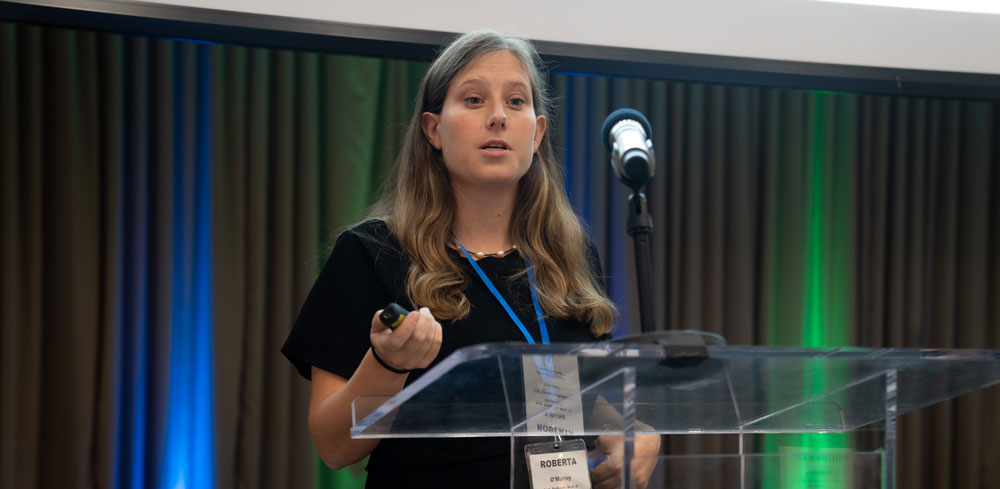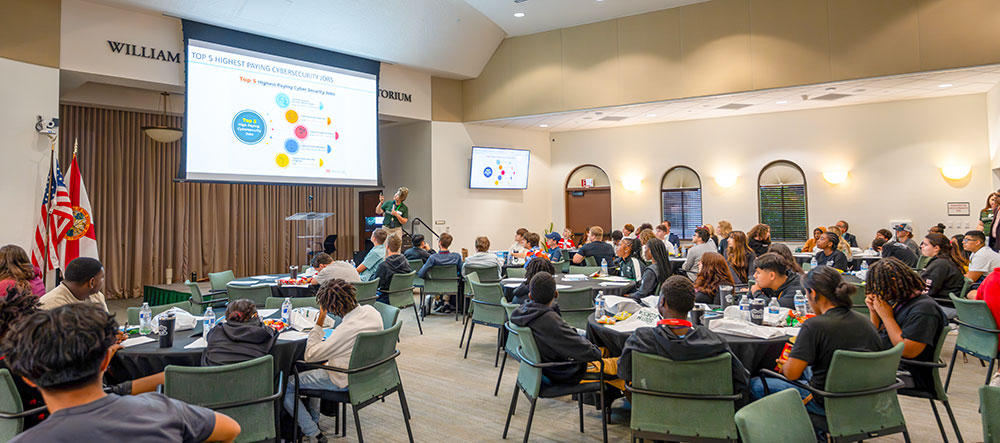By Marc R. Masferrer, University Communications and Marketing
USF Sarasota-Manatee will play a major role in the new Bellini College of Artificial Intelligence, Cybersecurity and Computing, with several members of the campus’s faculty already conducting research in AI, cybersecurity and other computing-related fields.
The goal of the college, which will open in fall 2025, is to position USF, the Tampa Bay region and the state as leaders in the rapidly evolving fields of AI and cybersecurity.
“As AI and cybersecurity quickly evolve, the demand for professionals skilled in these areas continues to grow, along with the need for more research to better understand how to utilize powerful new technologies in ways that improve our society,” USF President Rhea Law said, in announcing plans for the college last year. “Through the expertise of our faculty and our strong partnerships with the business community, the University of South Florida is strategically positioned to be a global leader in these fields.”
USF announced on March 11 a record-setting $40 million gift to establish the Bellini College of Artificial Intelligence, Cybersecurity and Computing. This transformational investment — the largest in USF’s nearly 70-year history — marks the first named college in the U.S. dedicated exclusively to the convergence of AI and cybersecurity.
The work being done by many USF Sarasota-Manatee faculty members highlights the interdisciplinary nature of much of the work that might come under the new college. For instance, criminologist Roberta O’Malley said her research on online sextortion and other cybercrime has led to collaborations with experts in psychology, cybersecurity and AI.
“Studying cybercrime is an opportunity for overlapping research in so many areas,” said O’Malley, an assistant professor in the College of Behavioral and Community Sciences.

Roberta O'Malley, Criminologist
The new college will create new opportunities for the Sarasota-Manatee campus to respond to and meet the workforce, research and other needs in the region, reflecting USF's commitment to being at the forefront of rapidly emerging developments in AI and cybersecurity and to be a leader in Sarasota-Manatee and beyond.

Professor Giti Javidi speaks to high school students during the Cybersecurity and AI Day in the Selby Auditorium in October 2024.
Interdisciplinary opportunities
Questions about artificial intelligence are increasingly becoming part of myriad academic disciplines, ranging from marketing and cybersecurity to education and health care, opening new opportunities for interdisciplinary research. Professors Giti Javidi and Ehsan Sheybani from the Muma College of Business highlight their Applied Research Collaborative (ARC) lab at USF Sarasota-Manatee as a perfect venue for such endeavors. The lab is equipped with computers, as well as virtual reality gear, a humanoid robot named “Neo,” and an “e-nose,” among other AI tools. The lab provides an ideal space for researchers from across the university to incorporate these devices to address possible gaps in their research. “AI is inherently an interdisciplinary field, making it an excellent area for scholars from various disciplines to collaborate and tackle challenging research areas together,” said Javidi, who is also part of the planning committee for the new college of artificial intelligence, cybersecurity, and computing at USF. The ARC lab has been supported by the generous support of industry partners such as Sylint Inc., a Sarasota-based cybersecurity firm. Sylint's support of the lab enabled the hiring of a research associate who joined the team to explore how organizations can better respond to cybersecurity threats. This work is being published in a highly reputable business journal. Additionally, a subsequent gift from Sylint is allowing a doctoral student to join the ARC lab, further advancing the lab’s research capabilities.
The focus the new college will bring will make USF a leader in the field in Sarasota-Manatee and beyond.
Karen Holbrook, Regional Chancellor
Researching 'sextortion' and other cyberfraud
Roberta O’Malley’s research on sextortion — a digital brand of cyberfraud where an offender threatens to distribute intimate videos, images or information unless the victim complies with financial or other demands — has taken her to some of the darkest places of the internet and human nature, as she studied the motivations of offenders and the reluctance of many victims to tell their stories to law enforcement. As an example of her findings, O’Malley said half of the 215 men she surveyed reported thoughts of death or suicide, after they were compromised by material they had provided offenders they had met via dating and other social media apps. O’Malley, who previously studied how pedophiles used the internet to exploit children, said her research has provided guidance for law enforcement as they try to understand what is a relatively new type of crime made more challenging to investigate by advances in technology. “It’s been validating for them to see empirical research on something they are dealing with,” O’Malley said. And kicking off in 2025, O'Malley and George Burruss will be co-directors of a new cybercrime research lab, which will be on the Sarasota-Manatee campus.
Using artificial intelligence to build trust
Assistant Professor Triparna de Vreede of the School of Information Systems and Management at USF Sarasota-Manatee says her training in psychology, information systems and business helps guide her research in behavioral artificial intelligence (BAI), which examines how people interact with artificial intelligence, the consequences of those interactions and how to build AI systems that are effective, efficient and trustworthy. In the various projects she is working on in the Muma College of Business’s BAI lab in Tampa, de Vreede says she and her team are researching how to use BAI to address real world questions. In one project, de Vreede is studying what type of AI-based chatbot system would best suit a technology employment agency that matches computer programmers with potential employers. In another project, she is examining how AI might help students set goals. “We wouldn’t think to ask any question that doesn’t have real world applications,” de Vreede said.
Empowering victims of cyberfraud
Criminologist Fawn Ngo of the College of Behavioral and Community Sciences at USF Sarasota-Manatee was the lead author of “Cyber Hygiene and Cyber Victimization Among Limited English Proficiency (LEP) Internet Users: A Mixed-Method Study,” which was published in the journal Victims & Offenders. The study showed that many well-intentioned LEP users engage in risky online behaviors such as using unsecured networks and sharing passwords and are reluctant to report when they are victimized online. Ngo is developing a website that will include cybersecurity information and resources in different languages and a link to report victimization. “Security systems are only as strong as the people who use them,” Ngo said. “If we want to secure our digital borders, we must ensure that every member in society, regardless of their language skills, is well-informed about the risks inherent in the cyber world.”
This story was updated after USF announced an historic $40 million gift for the naming of the Bellini College of Artificial Intelligence, Cybersecurity and Computing.